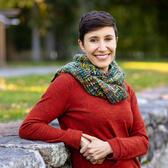Ending Abuse Through Activism and Ritual
Few people use their employment bonuses to start an organization of their own. But at 23, Holly Shulman -- listed in “Real Hot 100” -- is setting a new standard. Instead of enhancing her wardrobe or beefing up her music collection, Shulman used her bonus to found “Vote Against Violence,” a political action committee to combat domestic violence and sexual assault.
A recent graduate of Vassar College from Demarest, New Jersey, Shulman credits her father -- a rabbi -- for her commitment to activism and her mother -- a feminist -- for her commitment to women’s advocacy. While in school, she majored in Urban Studies with concentrations in politics and religion.
“Vote Against Violence” (VAV) identifies political candidates whose platforms advocate for domestic violence prevention policies. VAV campaigns for these candidates and helps get them elected. In a Washington Post article, Shulman points out that most policies affecting domestic violence issues often have unintended consequences. The federal marriage amendment, if passed, might grant legal protections against domestic violence only in situations in which a couple is legally married, thus excluding all unmarried couples who are cohabitating. Shulman is committed to putting people in Congress who pay attention to the unintended consequences of legislation and advocate for change.
Domestic violence is no stranger to the Jewish community. In response to this pervasive problem, Shulman’s efforts are joined by those of
Hanna Weinberg and Rebecca Chernin along with several Jewish organizational movements to bring attention to what has often been a taboo subject among Jews.
Raised in the Orthodox community and married to an Orthodox rabbi, Weinberg became increasingly concerned about the prevalence of domestic abuse in the Jewish community. In the Baltimore area, she established two safe houses for battered women and, in collaboration with leading rabbis, has played a key role in developing a compelling Orthodox approach to combating domestic violence.
Like Weinberg, Rebecca Chernin was also raised in an Orthodox home. As a result of her own experience in an emotionally abusive and physically intimidating relationship, she became an activist against violence in teen dating and domestic abuse. In 2002, during her senior year at the New Jewish High School, Chernin began working as an intern with REACH Beyond Domestic Violence (formerly called the Support Committee For Battered Women) and dedicated herself to outreach efforts in the Jewish community by contacting synagogues, youth groups, and schools to raise awareness.
Recent years have brought heightened attention to the injustices experienced by agunot, Jewish women whose husbands refuse to grant them a get (bill of divorce) and are thereby enslaved to marriage. The Organization for the Resolution of Agunot (ORA) works with lawyers and batei din (rabbinical courts) to help women gain freedom from marriages that are often abusive.
Domestic violence awareness has also become integrated into Jewish ritual and spiritual practice. Many haggadot used at Passover focus on freedom from sexual violence as a modern expression of the Exodus story. Similarly, the sukkah has come to represent a peaceful dwelling space in which women who are victims of sexual violence can seek refuge. Contemporary mikvaot (ritual baths) such as Mayyim Hayyim Living Waters – Community Mikveh and Education Center have created special mikveh immersion rituals for women who have been victims of domestic abuse and are in need of spiritual healing.
Be sure to learn about the anti-violence initiatives of Jewish Women International.The brave women who have dedicated their lives to the prevention of sexual violence are an inspiration to us all.






